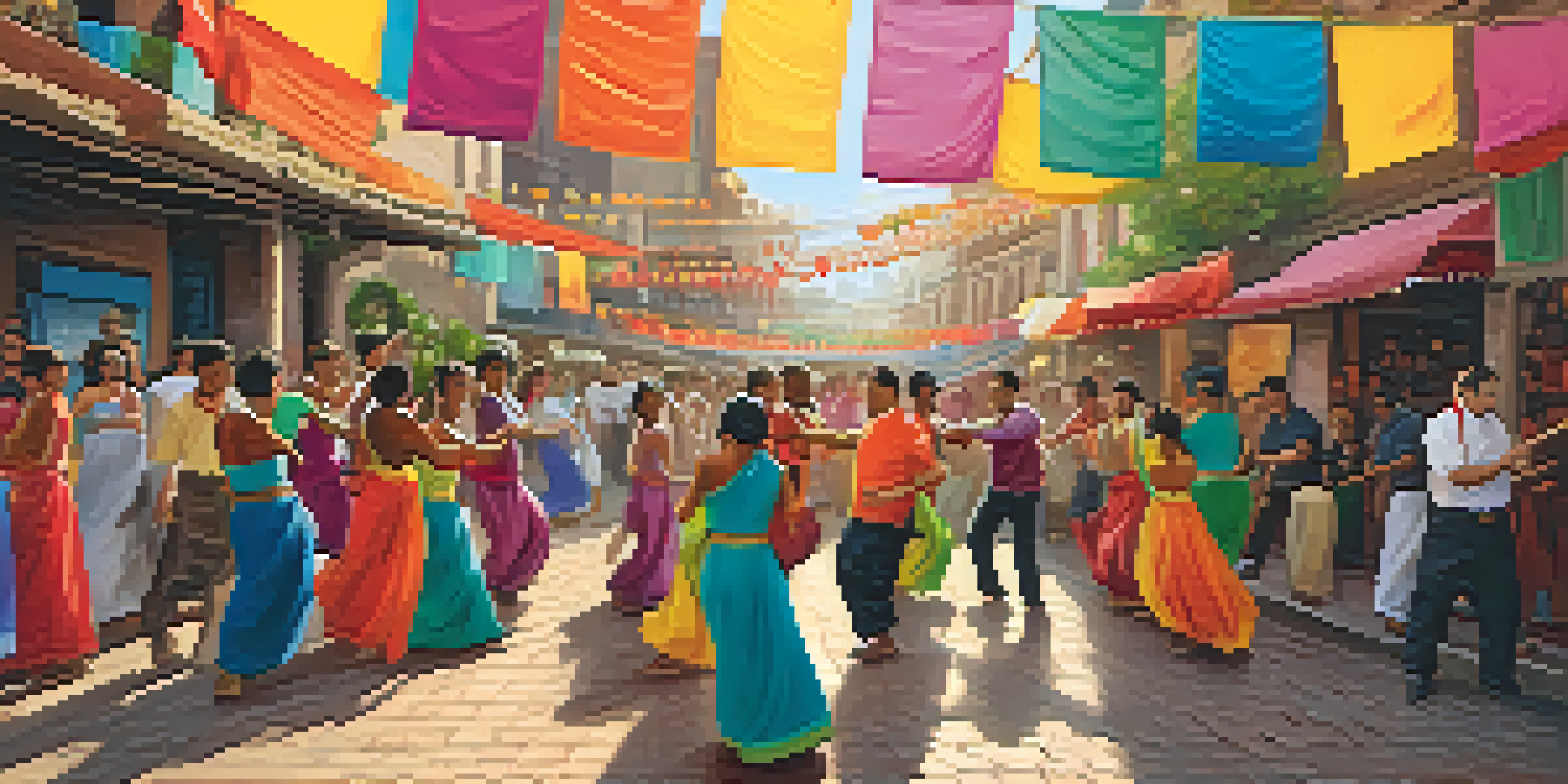The Role of Music in Rituals and Cultural Celebrations

Music as a Universal Language in Rituals
Music transcends barriers, serving as a universal language that connects people during rituals. It evokes emotions, fosters unity, and creates an atmosphere conducive to spiritual experiences. Whether it's a wedding, funeral, or festival, music plays a pivotal role in expressing collective sentiments that words alone often cannot convey.
Music can change the world because it can change people.
For instance, think about how a simple melody can transform a mundane ceremony into a memorable occasion. The right song can bring tears of joy or trigger nostalgic memories, making the event feel more profound. This emotional connection emphasizes why music is integral to rituals across cultures.
Moreover, music often helps to mark transitions in life, guiding participants through significant moments. From the joyous beats of a wedding march to the somber notes of a requiem, music frames our experiences, ensuring they are felt deeply and remembered long after the event concludes.
The Role of Music in Cultural Celebrations
Cultural celebrations are vibrant expressions of identity, and music is at their heart. It not only entertains but also educates attendees about traditions and values passed through generations. Take, for example, the lively rhythms of a carnival; these sounds are often steeped in history, telling stories of resilience and community.

During these celebrations, music provides a communal experience that strengthens social bonds. People come together to dance, sing, and celebrate their heritage, creating an environment where everyone feels included. This shared experience fosters a sense of belonging, making cultural celebrations memorable.
Music Unites People in Rituals
Music serves as a universal language that evokes emotions and fosters unity during various rituals.
Additionally, music can serve as a form of resistance and empowerment during cultural celebrations. In many cases, songs reflect the struggles and triumphs of a community, allowing individuals to express pride in their identity. This aspect of music not only honors the past but also inspires future generations to embrace their cultural roots.
The Emotional and Spiritual Impact of Music
Music has a profound emotional and spiritual impact during rituals and celebrations. It can evoke feelings of joy, sadness, nostalgia, or hope, enhancing the overall experience. For many, music acts as a bridge between the physical and spiritual realms, creating a sacred space where individuals can connect with something greater than themselves.
Where words fail, music speaks.
Consider how a haunting melody can fill a church during a service, inviting reflection and contemplation. This spiritual resonance is why many religious traditions incorporate music into their ceremonies, believing that it facilitates a deeper connection with the divine. The combination of melody, harmony, and lyrics can create a powerful atmosphere that nurtures spiritual growth.
Moreover, music can also serve as a healing tool during difficult times. In rituals of mourning, for instance, songs can provide comfort and solace, helping individuals process their grief. This ability to heal through music illustrates its vital role in both personal and communal rituals, allowing for emotional release and connection.
Music and Community Engagement
Community engagement is often sparked by music, drawing people together for shared experiences during rituals and celebrations. Local musicians and artists frequently perform at these events, showcasing their talents while fostering a sense of pride within the community. This engagement not only supports local culture but also strengthens community ties.
For example, think about how a local festival might feature traditional dances and performances, inviting participation from everyone. This inclusivity encourages community members to take part, regardless of their skill level or background. By engaging in music-making, individuals feel a sense of ownership over their cultural identity.
Cultural Identity Through Music
Music plays a crucial role in cultural celebrations, educating attendees about traditions and enhancing community bonds.
Furthermore, music can inspire collaboration among diverse groups within a community. When different cultures come together to share their musical traditions, it promotes understanding and respect. This exchange enriches the community, creating a vibrant tapestry of sounds that reflects its collective identity.
The Evolution of Musical Traditions in Rituals
Musical traditions are not static; they evolve over time, adapting to societal changes while maintaining their core essence. This evolution can be seen in how contemporary artists reinterpret traditional songs for modern audiences, ensuring that the music remains relevant. For example, many indigenous cultures blend ancient melodies with contemporary styles to keep their heritage alive.
As societies become more interconnected, musical influences cross borders, leading to new hybrid forms. This blending enriches cultural rituals, allowing them to remain dynamic and engaging. Such innovations invite new generations to connect with their roots in fresh and exciting ways.
However, it's essential to approach this evolution with respect for the original traditions. While innovation is important, honoring the cultural significance and history behind the music ensures that the essence of the rituals remains intact. This balance between tradition and modernity is crucial in preserving the rich tapestry of cultural celebrations.
The Importance of Preservation in Musical Heritage
Preserving musical heritage is vital for maintaining cultural identity, especially in an ever-globalizing world. As music evolves, some traditional forms may risk being forgotten. Therefore, documenting and teaching these musical forms ensures that future generations can appreciate their history and significance.
For instance, many communities engage in oral traditions, passing down songs and stories from generation to generation. This practice not only keeps the music alive but also fosters a sense of pride and belonging. Efforts such as workshops, festivals, and educational programs play a crucial role in preserving these musical traditions.
Music Drives Social Change
Throughout history, music has been a powerful tool for advocacy, raising awareness and inspiring collective action for social causes.
Additionally, technology has emerged as a powerful ally in the preservation of musical heritage. Digital recordings, social media, and streaming platforms allow traditional music to reach wider audiences, promoting appreciation and understanding. This accessibility can inspire a new wave of interest in cultural rituals, ensuring that the music continues to be celebrated.
Music as a Catalyst for Change in Society
Music has the power to drive social change, particularly during rituals and celebrations that highlight important causes. Songs can raise awareness, inspire action, and unite people around shared ideals. For example, during protests or movements, anthems often emerge as rallying cries, capturing the spirit of the times.
Consider how music has been used throughout history to challenge injustices and promote social movements. From folk songs during the civil rights movement to contemporary protest anthems, music serves as a powerful tool for advocacy. It galvanizes communities, encouraging individuals to stand together for a common cause.

Moreover, music can foster empathy by telling stories that resonate with listeners on a personal level. When people hear songs that reflect the struggles of others, it can inspire understanding and compassion. This emotional connection can lead to greater social awareness and motivate collective action, making music an essential catalyst for change.